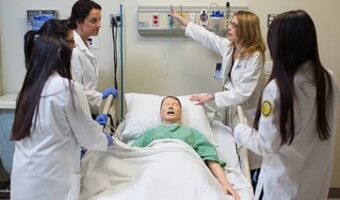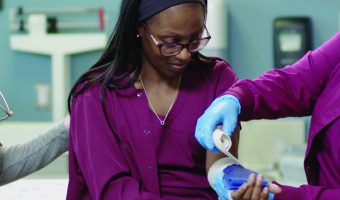Program Overview

If you are deciding which health science profession you wish to pursue, or simply want to explore all the health professions available to you, this program is an appealing option! Health care is a vast field including many professionals who work together to promote health and wellness in society. The program is designed to expose you to a variety of healthcare needs for people of all ages. Students who select this program are also eligible to transfer, if able to meet admission criteria, to one of the health science programs offered at NEIT by the third term. Transition is seamless. Faculty are dedicated to exploring your interests to learn more about healthcare in general. Their combined expertise brings a rich, supportive environment for both students new to higher education and those returning to university after many years of prior education.
Graduates of this program may enter:
Bachelor of Science Degree in Rehabilitation Sciences
Bachelor of Science Degree in Business Management with the Healthcare Management/Respiratory Care concentration
Full Description
The Associate in Science in Health Science program is an introduction to the health sciences and the job opportunities that are available in healthcare fields for associate degree graduates. The program does several things: first, it introduces students to fundamental concepts in the sciences and acquaints them with healthcare disciplines and the skills that are germane to each discipline through a general healthcare degree track; and, second, it prepares students for entry into the following Health Sciences programs:
- Medical Laboratory Technology
- Nursing
- Occupational Therapy Assistant
- Physical Therapist Assistant
- Respiratory Care
- Surgical Technology
- Veterinary Technology
The program includes studies in core areas of health sciences with introductory courses in anatomy and physiology, biology, medical terminology, electronic medical records and healthcare informatics. Students will take courses that expose them to the experiences of practitioners involved in healthcare fields.
Upon completion of the program, some students will graduate and assume responsibilities in entry level positions in the healthcare field. Graduates are prepared and encouraged to continue their education in one of our bachelor’s programs, such as Business Management with the Healthcare Management Concentration or Rehabilitation Sciences, both of which prepare graduates for positions in a variety of healthcare settings; or to advance their education to apply for a Master of Public Health degree.
Potential Career Opportunities
The Associate in Science in Health Science program enables graduates to move on to pursue a variety of healthcare professions, including:
Medical Assistant
Health Information Technologist
Pharmacy Technician
Surgical Technologist
Occupational Therapy Assistant
Respiratory Therapist
FAQ
-
What can you do with an associate degree in health science?
Health sciences careers are some of the fastest-growing professions. Earning an Associate in Science degree in Health Science is a great way to break into the medical field. Degree holders can pursue jobs as a medical administrative assistant or administrative assistant. These individuals are typically employed in medical offices, hospitals, or nursing homes.
-
Can you be a medical assistant with a health science degree?
Individuals with an associate degree in Health Science can easily choose career paths in health care as medical assistants. The degree will prepare them for the healthcare job’s responsibilities and help them stand out from other applicants.
-
Is a degree in health science worth it?
A degree in health science has many benefits. It prepares students for careers in the medical field by instructing them on healthcare, health promotion, disease prevention, and improving their patients’ lives. Degree holders may pursue work as medical assistants, medical administrative assistants, and pharmacy technicians.
Current statistics on potential salaries and job outlook are listed on the Bureau of Labor Statistics (BLS) website.
-
Can you become a physician with a health science degree?
Individuals with degrees in health science can apply to medical school, though students must first complete the program and match with residency before becoming a physician.



